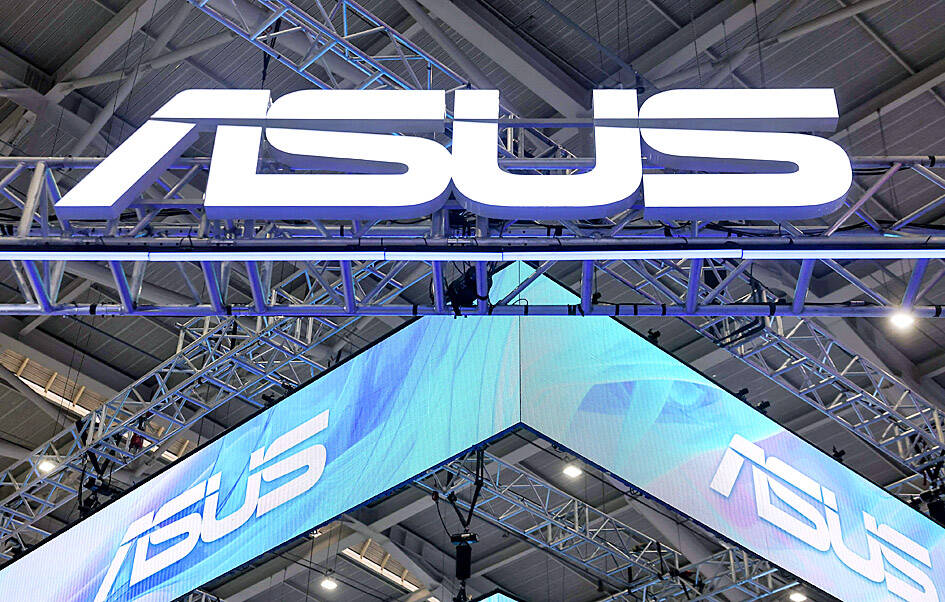Asustek Computer Inc (華碩電腦) yesterday said it has received orders for its new artificial intelligence (AI) servers powered by Nvidia Corp’s HGX H200 chips, with the first shipments scheduled for next month, fueling already strong server revenue growth.
That would add to the already strong revenue growth from the computer vendor’s new server business, which accounted for about 10 to 15 percent of the company’s total revenue last quarter. More than 80 percent of servers shipped by Asustek are AI-enabled, the company said.
The New Taipei City-based company said the new AI server series, dubbed ESC N8-E11, is equipped with eight Nvidia H200 Tensor graphics processing units (GPUs) and two Intel Corp Xeon central processing units (CPUs), allowing it to handle a variety of AI workloads.

Photo: Cheng I-Hwa, AFP
The new AI server supports both liquid and air cooling systems, Asustek said.
The H200 GPU is more powerful than its predecessor, H100, with twice the memory capacity and 40 percent greater bandwidth, the company said.
A majority of the company’s AI servers to be shipped in the second half of this year would be powered by H200 and H100 chips, both based on Nvidia’s Hopper platform, rather than Nvidia’s new Blackwell GPUs, which face a delay in shipments due to design flaws.
The Blackwell-based GPU is expected to see shipments ramp up next year, market researcher TrendForce Corp (集邦科技) said earlier this month.
Separately, Wistron Corp (緯創), which supplies GPU server modules to Nvidia, yesterday said that global demand from cloud service providers and enterprise customers for the development of AI technology is still strong, especially in the server market.
“I don’t see any particular signs of weakening. Demand is really still very good,” the Chinese-language Liberty Times (The Taipei Times’ sister newspaper) quoted Wistron chief executive officer Jeff Lin (林建勳) as saying on the sidelines of an event in Taipei yesterday.
Lin said that this market situation would persist until the end of the fourth quarter or early next year.

When an apartment comes up for rent in Germany’s big cities, hundreds of prospective tenants often queue down the street to view it, but the acute shortage of affordable housing is getting scant attention ahead of today’s snap general election. “Housing is one of the main problems for people, but nobody talks about it, nobody takes it seriously,” said Andreas Ibel, president of Build Europe, an association representing housing developers. Migration and the sluggish economy top the list of voters’ concerns, but analysts say housing policy fails to break through as returns on investment take time to register, making the

‘SILVER LINING’: Although the news caused TSMC to fall on the local market, an analyst said that as tariffs are not set to go into effect until April, there is still time for negotiations US President Donald Trump on Tuesday said that he would likely impose tariffs on semiconductor, automobile and pharmaceutical imports of about 25 percent, with an announcement coming as soon as April 2 in a move that would represent a dramatic widening of the US leader’s trade war. “I probably will tell you that on April 2, but it’ll be in the neighborhood of 25 percent,” Trump told reporters at his Mar-a-Lago club when asked about his plan for auto tariffs. Asked about similar levies on pharmaceutical drugs and semiconductors, the president said that “it’ll be 25 percent and higher, and it’ll

NOT TO WORRY: Some people are concerned funds might continue moving out of the country, but the central bank said financial account outflows are not unusual in Taiwan Taiwan’s outbound investments hit a new high last year due to investments made by contract chipmaker Taiwan Semiconductor Manufacturing Co (TSMC, 台積電) and other major manufacturers to boost global expansion, the central bank said on Thursday. The net increase in outbound investments last year reached a record US$21.05 billion, while the net increase in outbound investments by Taiwanese residents reached a record US$31.98 billion, central bank data showed. Chen Fei-wen (陳斐紋), deputy director of the central bank’s Department of Economic Research, said the increase was largely due to TSMC’s efforts to expand production in the US and Japan. Investments by Vanguard International

WARNING SHOT: The US president has threatened to impose 25 percent tariffs on all imported vehicles, and similar or higher duties on pharmaceuticals and semiconductors US President Donald Trump on Wednesday suggested that a trade deal with China was “possible” — a key target in the US leader’s tariffs policy. The US in 2020 had already agreed to “a great trade deal with China” and a new deal was “possible,” Trump said. Trump said he expected Chinese President Xi Jinping (習近平) to visit the US, without giving a timeline for his trip. Trump also said that he was talking to China about TikTok, as the US seeks to broker a sale of the popular app owned by Chinese firm ByteDance Ltd (字節跳動). Trump last week said that he had